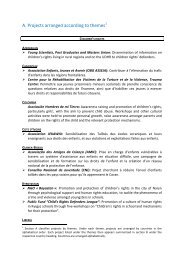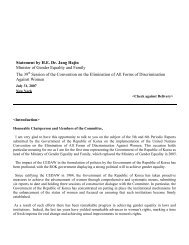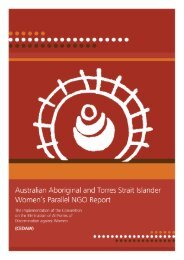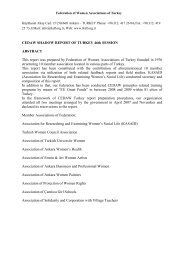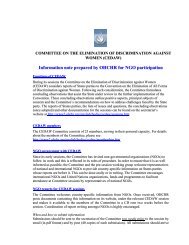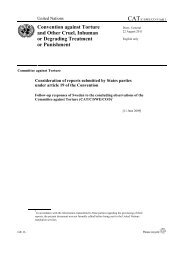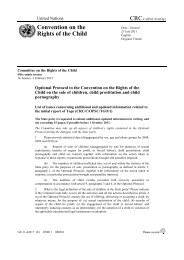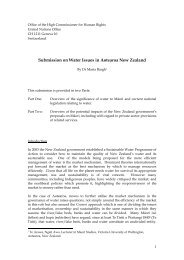Report - Office of the High Commissioner on Human Rights
Report - Office of the High Commissioner on Human Rights
Report - Office of the High Commissioner on Human Rights
- No tags were found...
You also want an ePaper? Increase the reach of your titles
YUMPU automatically turns print PDFs into web optimized ePapers that Google loves.
2.4 The Elements <str<strong>on</strong>g>of</str<strong>on</strong>g> <str<strong>on</strong>g>the</str<strong>on</strong>g> <strong>Human</strong> Right to Adequate Housing as a M<strong>on</strong>itoring Framework 9<br />
A case developed in resp<strong>on</strong>se to a violati<strong>on</strong> <str<strong>on</strong>g>of</str<strong>on</strong>g> <str<strong>on</strong>g>the</str<strong>on</strong>g> right to adequate housing must be based <strong>on</strong> <str<strong>on</strong>g>the</str<strong>on</strong>g><br />
three pillars <str<strong>on</strong>g>of</str<strong>on</strong>g> morals, laws and statistical data.<br />
a. The moral argument<br />
<strong>Human</strong> rights provide a comm<strong>on</strong> language for moral issues based <strong>on</strong> identifying <str<strong>on</strong>g>the</str<strong>on</strong>g> basic human needs<br />
<str<strong>on</strong>g>of</str<strong>on</strong>g> people affected. For example, peoples’ movements have articulated what ‘home’ means to <str<strong>on</strong>g>the</str<strong>on</strong>g>m in<br />
statements such as <str<strong>on</strong>g>the</str<strong>on</strong>g> Indian Nati<strong>on</strong>al Housing <strong>Rights</strong> Bill, 1988, <str<strong>on</strong>g>the</str<strong>on</strong>g> Jerusalem Declarati<strong>on</strong>, 1994 (identifies<br />
Palestinian housing rights under military occupati<strong>on</strong>), <str<strong>on</strong>g>the</str<strong>on</strong>g> Bangkok Declarati<strong>on</strong>, 1995 (identifies <str<strong>on</strong>g>the</str<strong>on</strong>g><br />
comm<strong>on</strong> priority <str<strong>on</strong>g>of</str<strong>on</strong>g> land rights, particularly for indigenous and tribal peoples) and <str<strong>on</strong>g>the</str<strong>on</strong>g> Draft World<br />
Charter <strong>on</strong> <strong>Rights</strong> to <str<strong>on</strong>g>the</str<strong>on</strong>g> City, due to be completed in 2005, (identifies urban land and housing issues<br />
- transportati<strong>on</strong>, energy, forced evicti<strong>on</strong>s etc.).<br />
b. The legal argument<br />
<strong>Human</strong> rights also provide a comm<strong>on</strong> legal framework, which is articulated through treaties, world<br />
c<strong>on</strong>ference documents and o<str<strong>on</strong>g>the</str<strong>on</strong>g>r internati<strong>on</strong>al agreements, as well as through nati<strong>on</strong>al c<strong>on</strong>stituti<strong>on</strong>s<br />
and laws. These form <str<strong>on</strong>g>the</str<strong>on</strong>g> sources <str<strong>on</strong>g>of</str<strong>on</strong>g> <str<strong>on</strong>g>the</str<strong>on</strong>g> legal right to adequate housing.<br />
Within internati<strong>on</strong>al law <str<strong>on</strong>g>the</str<strong>on</strong>g>re are ‘hard law’ and ‘s<str<strong>on</strong>g>of</str<strong>on</strong>g>t law’ sources for <str<strong>on</strong>g>the</str<strong>on</strong>g> right to adequate housing.<br />
Hard law sources c<strong>on</strong>sist <str<strong>on</strong>g>of</str<strong>on</strong>g> human rights treaties (such as CEDAW), which are agreed up<strong>on</strong>, signed<br />
and ratified by States. Once ratified, <str<strong>on</strong>g>the</str<strong>on</strong>g> treaties become obligatory and come into force domestically<br />
through nati<strong>on</strong>al laws. Once ratified, governments have binding obligati<strong>on</strong>s to <str<strong>on</strong>g>the</str<strong>on</strong>g>ir citizens and to<br />
o<str<strong>on</strong>g>the</str<strong>on</strong>g>r States to implement <str<strong>on</strong>g>the</str<strong>on</strong>g> treaty standards, which form hard law sources for rights. In additi<strong>on</strong>,<br />
<str<strong>on</strong>g>the</str<strong>on</strong>g>re are certain mechanisms for enforcement that operate in accompaniment to such treaties, e.g. <str<strong>on</strong>g>the</str<strong>on</strong>g><br />
obligati<strong>on</strong> to report regularly to treaty committees as well as complaints procedures under <str<strong>on</strong>g>the</str<strong>on</strong>g> opti<strong>on</strong>al<br />
protocols.<br />
S<str<strong>on</strong>g>of</str<strong>on</strong>g>t law refers to <str<strong>on</strong>g>the</str<strong>on</strong>g> interpretati<strong>on</strong> <str<strong>on</strong>g>of</str<strong>on</strong>g> treaties (e.g. general comments or c<strong>on</strong>cluding observati<strong>on</strong>s made<br />
by treaty committees) and n<strong>on</strong>-binding internati<strong>on</strong>al agreements (e.g. declarati<strong>on</strong>s, world c<strong>on</strong>ference<br />
outcome documents etc.), which reflect <str<strong>on</strong>g>the</str<strong>on</strong>g> general political will <str<strong>on</strong>g>of</str<strong>on</strong>g> States to implement principles, but<br />
are not in <str<strong>on</strong>g>the</str<strong>on</strong>g>mselves binding mechanisms. For example, while still c<strong>on</strong>stituting an important<br />
internati<strong>on</strong>al agreement, <str<strong>on</strong>g>the</str<strong>on</strong>g> Millennium Declarati<strong>on</strong> <str<strong>on</strong>g>of</str<strong>on</strong>g> 2000 (which c<strong>on</strong>tains <str<strong>on</strong>g>the</str<strong>on</strong>g> Millennium<br />
Development Goals) is not binding. Similarly, while Security Council resoluti<strong>on</strong>s are enforceable,<br />
General Assembly resoluti<strong>on</strong>s are not, <str<strong>on</strong>g>the</str<strong>on</strong>g> latter forming part <str<strong>on</strong>g>of</str<strong>on</strong>g> s<str<strong>on</strong>g>of</str<strong>on</strong>g>t law.<br />
Although s<str<strong>on</strong>g>of</str<strong>on</strong>g>t law is not binding, it can still be useful in addressing human rights violati<strong>on</strong>s. For<br />
instance, where <str<strong>on</strong>g>the</str<strong>on</strong>g> treaty text does not provide specific guidance <strong>on</strong> what is required to achieve <str<strong>on</strong>g>the</str<strong>on</strong>g><br />
rights recognised, s<str<strong>on</strong>g>of</str<strong>on</strong>g>t law interpretati<strong>on</strong>s can be looked to as a guide. It is strategically important to<br />
be able to identify those sources that have an obligatory power from those that do not, and understand<br />
how each <strong>on</strong>e could be relatively invoked and applied.<br />
c. The statistical argument<br />
Numbers provide a clear means <str<strong>on</strong>g>of</str<strong>on</strong>g> identifying <str<strong>on</strong>g>the</str<strong>on</strong>g> real dimensi<strong>on</strong>s <str<strong>on</strong>g>of</str<strong>on</strong>g> <str<strong>on</strong>g>the</str<strong>on</strong>g> problem (i.e. <str<strong>on</strong>g>the</str<strong>on</strong>g> numbers<br />
<str<strong>on</strong>g>of</str<strong>on</strong>g> victims; <str<strong>on</strong>g>the</str<strong>on</strong>g> extent <str<strong>on</strong>g>of</str<strong>on</strong>g> <str<strong>on</strong>g>the</str<strong>on</strong>g> damage). Numbers assist to quantify <str<strong>on</strong>g>the</str<strong>on</strong>g> material and n<strong>on</strong>-material costs<br />
<str<strong>on</strong>g>of</str<strong>on</strong>g> a violati<strong>on</strong> (e.g. in cases <str<strong>on</strong>g>of</str<strong>on</strong>g> inheritance, land c<strong>on</strong>fiscati<strong>on</strong>, forced evicti<strong>on</strong>s etc.). It is important to<br />
9<br />
This sessi<strong>on</strong> was presented by Joseph Schechla.<br />
10 WOMEN’S RIGHTS TO ADEQUATE HOUSEING AND LAND




